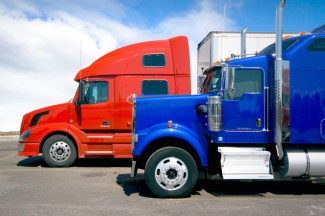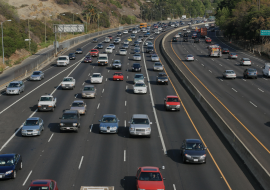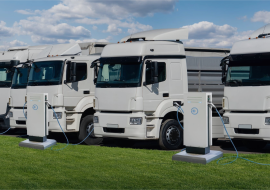Transportation is the largest source of greenhouse gas (GHG) emissions in the United States. Shipping freight more efficiently would help.
Freight transportation refers to the commercial movement of goods by road, ship, rail, or air. Economic growth in the United States has increased the need for this type of transport. We have met this need primarily by putting more vehicles on the road (even though other options, particularly rail, would be more efficient in some cases). These on-road freight vehicles are mostly heavy-duty trucks (those weighing above 26,000 pounds). Despite making up less than 5% of vehicles on the road, these trucks are responsible for more than 30% of transportation emissions. To transport goods sustainably, we must improve both the efficiency of freight vehicles and the broader freight system.
The main freight efficiency standards in the United States are the federal GHG emission standards for heavy-duty vehicles. Adopted in 2011 and updated in 2016, these standards have ramped up freight efficiency in two phases. The Phase 1 standards covered model years 2014–2016, and the Phase 2 standards cover model years 2018–2027. Phase 2 is expected to save 800,000 barrels of oil per day by 2040.
Building on the federal standards, in 2020 California developed its Advanced Clean Trucks Regulation and its Heavy-Duty Vehicle and Engine Regulation. The first requires the rapid electrification of trucks, and the second will regulate the smog-causing NOx emissions of traditional trucks during the transition to an electric fleet
Despite this progress toward vehicle efficiency, freight continues to be bogged down by logistical inefficiencies. Too often, trucks are driven empty or at low capacity, and the demand for speedy delivery favors trucks even when other modes of transport would be more efficient. Improvements in logistics, vehicle tracking, and business practices would enable more efficient allocation of freight resources and decrease GHG emissions.
ACEEE advances freight transportation efficiency by investigating technologies that reduce the fuel consumption of trucks and other freight vehicles. We also study opportunities to enhance the energy efficiency of the freight network as a whole. ACEEE supports the expansion of freight systems that permit goods to travel by the most efficient mode or combination of modes, minimizing fuel use, GHG and other harmful emissions, and highway congestion.
Highlighted Resources
Contact field
For more information or to contact a researcher, please visit the Transportation Program






